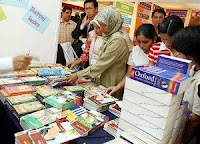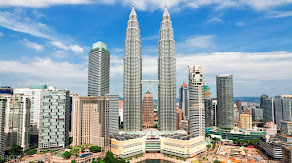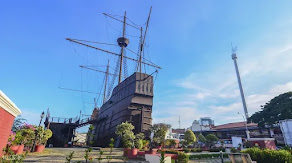Click Calendar to Enlarge
Malaysia is an Asia country contributes with many cultures. Malay,
Chinese and Indian are the 3 main cultures in Malaysia. Apart from
this, there are also several minority tribes in east Malaysia, such as
Iban and Bidayu. Because of the population formation, every culture
having own holiday celebration especially comes to New Year celebration. This is the reason sometime I also wonder there are how many public holidays Malaysia is celebrating.
Do you know the number of public holiday for Malaysia?
In general, most of company in Malaysia is having 17 days public
holiday set in their calendar. However there are normally more holidays
in the country than just 17 days. Because the country is forming by various state, Perak, Penang,
Trengganu, Selangor, Kelantan, etc the public holiday will divert to
state holiday and notional holiday. Individual company may celebrate
difference holiday base on their geographic location or state.
Various Holiday Nature
Before we go into the exact public holiday in Malaysia, the holidays can be classified into below categories:
New Year for main Culture. This include calendar new year, Chinese New Year, Hari Raya.
Religious. Such as Thaipusum, Wesak day, Christmas are the days classified as religious related.
Sultan (King) Birthday. The Agong birthday which fall on Jun & individual state sultan or governor’s birthday.
National day & international holiday. Labour days, national holiday.
In general, Malaysia is the country with many public holidays. The
public holiday in Malaysia is far more than many Asia country in the
region such as China, Hong Kong, Singapore. I will list out another
public holiday comparison table among the Asia countries.
MAJOR/ NATIONAL HOLIDAY
Malaysias celebrate many festivals throughout the year. During this celebrations, visitors to Malaysian home are offered festive cakes and delicacies.
 Hari Raya Aidil Fitri
Hari Raya Aidil Fitri
(determined by Muslim calender)
Hari Raya Aidil Fitri is celebrated by Muslim after month-long Ramadan (Fasting month). For Muslims, Hari Raya Aidil Fitri or Hari Raya Puasa marks the end of Ramadhan, a month of fasting from sunrise to sunset , and the first of syawal, the tenth month Muslim calendar. usher in the festival with prayers in the mosques followed by receiving well-wishers in their home by visits to the graves of the departed. Many tourists will be invited to sample the warm Malaysian hospitality during this occasion.
Hari Raya Aidil Adha (determined by Muslim calender)
Hari Raya Aidil Adha (Hari Raya Haji) falls on tenth day of Zulhijjah, the twelfth month of the Muslim calendar, ususally two month after Hari Raya Aidil Fitri. The festival is celebrated by Hajis and Hajjahs (men and women, respectively, who have made a pilgrim to Mecca)
Awal Muharram (determined by Muslim calender)
Awal Muharram (or Maal Hijrah) is the beginning of the Islamic New Year. This day coincides with the Prophet Muhammad’s journey from Mecca to Medina in 622AD on the first of Muharram.
 Prophet muhammad’s Birthday (determined by Muslim calender)
Prophet muhammad’s Birthday (determined by Muslim calender)
Prophet Muhammad’s was born on 12 Rabiulawal, the third month of the Muslim calender in 570AD. His Birthday is celebrated with religious lectures and recital of verses from the Koran.
Chinese New Year (January/ February)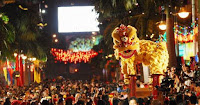
Chinese New Year is a joyous time when friends and relatives give each other angpows – red packets with a gift of cash as a token of prosperity and celebrate with feast and lion dances to ward off evil spirits and usher in the lunar new year. Family reunion dinners are a must among Chinese on the eve of the new year.
 Thaipusam (January/February- determined by Hindu calender)
Thaipusam (January/February- determined by Hindu calender)
A Hindu festival full of colour pageantry and throbbing excitement reminiscent of the Mardi Gras. It is an occasion for Hindu devotees to pay homage by piercing their bodies with sharp objects and carrying of ‘kavadis’ to Hindu temples. A Kavadi is either a metal or wooden arch with elaborate decorations, which is placed on devotee’s shoulder.
Vasakhi (April)
Vasakhi, celebrated by sikhs were baptised by Guru Gobind Singh, the Sikh’s 10 guru. Sikhs celebrate by religious prayers and by partaking of a vegetarian lunch.
 Wesak Day (May)
Wesak Day (May)
Celebrated by Buddhists. This day is the most important day in Buddhist calendar marking the birth, enlightenment and death of Lord buddha. Buddhist devotees will gather in temples throughout the country to release small birds and to offer prayers. Wesak is also an occasion to offer alms to monks.
Kaamatan Festival (May)
‘Kaamatan’ or Harvest Festival is celebrated by the Kadazans and Dusuns of Sabah to give thanks for a bountiful harvest. Highlights include a beauty contest, cultural dances and rituals culminating in the thanksgiving ceremony performed by the ‘bobohizan’ or high priestess
 Gawai Dayak (May/ June)
Gawai Dayak (May/ June)
This ceremony celebrated by the Dayaks of sarawak, marks the end of the paddy-planting season. Join the harvest celebrations of the Ibans and Bidayuhs as they gather in their traditional long-houses for family reunions, games and feasting.Their gather traditional long-houses for family reunions
Festival of San Pedro (June)
Festival of San Pedro a delightful cultural event where the descendants of early Portuguese settlers celebrate the birthday of the patron saint of fisherman, St. Pedro. The fishing boats which are colourfully decorated for the festivals are blessed and prayers offered for a better season.
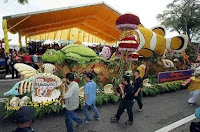 Flora Festival/ Parade (July)
Flora Festival/ Parade (July)
Kuala Lumpur, the Garden City blooms even lovelier during this week. There will be flora hunts, flower sales, exhibitions of Malaysia’s diverse flora at public gardens, and hotel lobbies. Shopping complexes will also be attractively-displayed with floral arrangements. This week culminates in a spectacular international Floral Parade.
National Day (31 August)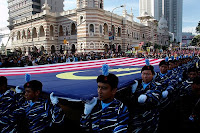
The country celebrates it’s independence on 31 August with parades, exhibitions, stage shows and other cultural activities will be held. Towns and cities throughout Malaysia will be gaily decorated and adorned with lights for the grand occasion
 Malaysia Fest (September)
Malaysia Fest (September)
For two weeks, all the major hotels and shopping complexes join forces to feature the culture, cuisine and handicraft of the various states in Malaysia.
The Moon Festivals (September)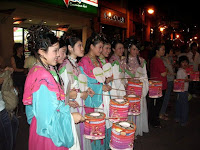
Perayaan ini dirayakan oleh masyarakat Cina pada hari ke-15 of the eight lunar month. Keistimewaan utama pada bulan hari ini ditandakan dengan mooncake and lanters. It was on this night in ancient china that the Hans overthrew the Mongols. Night celebrations see the making of sacrificial on open-air and lantern parades by children.
 Shopping Carnival (October)
Shopping Carnival (October)
Bargains galore at shopping establishments in Kuala Lumpur, Johor Bahru and Penang during this annual two weeks shopping extravaganza.
Deepavali (October/ November)
Deepavali is also known as the Festival of lights. Deepavali is celebrated by Hindus to commemorate the triumph of Lord Krishna over the forces of evil led by Nargansuran. During this festival, Hindu homes are emblazoned with lights to symbolize this triumph.
 Christmas (25 December)
Christmas (25 December)
Christmas is celebrated by Christians similar to any other part of the world. Midnight services are held at churches on Christmas eve. Shopping centres, hotels, oldfolks homes and children’s home echo with beautiful carols. The revelry and yuletide spirit of Christmas is enjoyed by Christians and non-Christians.
 Hari Raya Aidil Fitri
Hari Raya Aidil Fitri(determined by Muslim calender)
Hari Raya Aidil Fitri is celebrated by Muslim after month-long Ramadan (Fasting month). For Muslims, Hari Raya Aidil Fitri or Hari Raya Puasa marks the end of Ramadhan, a month of fasting from sunrise to sunset , and the first of syawal, the tenth month Muslim calendar. usher in the festival with prayers in the mosques followed by receiving well-wishers in their home by visits to the graves of the departed. Many tourists will be invited to sample the warm Malaysian hospitality during this occasion.
Hari Raya Aidil Adha (determined by Muslim calender)

Hari Raya Aidil Adha (Hari Raya Haji) falls on tenth day of Zulhijjah, the twelfth month of the Muslim calendar, ususally two month after Hari Raya Aidil Fitri. The festival is celebrated by Hajis and Hajjahs (men and women, respectively, who have made a pilgrim to Mecca)
Awal Muharram (determined by Muslim calender)
Awal Muharram (or Maal Hijrah) is the beginning of the Islamic New Year. This day coincides with the Prophet Muhammad’s journey from Mecca to Medina in 622AD on the first of Muharram.
 Prophet muhammad’s Birthday (determined by Muslim calender)
Prophet muhammad’s Birthday (determined by Muslim calender)Prophet Muhammad’s was born on 12 Rabiulawal, the third month of the Muslim calender in 570AD. His Birthday is celebrated with religious lectures and recital of verses from the Koran.
Chinese New Year (January/ February)
Chinese New Year is a joyous time when friends and relatives give each other angpows – red packets with a gift of cash as a token of prosperity and celebrate with feast and lion dances to ward off evil spirits and usher in the lunar new year. Family reunion dinners are a must among Chinese on the eve of the new year.
 Thaipusam (January/February- determined by Hindu calender)
Thaipusam (January/February- determined by Hindu calender)A Hindu festival full of colour pageantry and throbbing excitement reminiscent of the Mardi Gras. It is an occasion for Hindu devotees to pay homage by piercing their bodies with sharp objects and carrying of ‘kavadis’ to Hindu temples. A Kavadi is either a metal or wooden arch with elaborate decorations, which is placed on devotee’s shoulder.
Vasakhi (April)

Vasakhi, celebrated by sikhs were baptised by Guru Gobind Singh, the Sikh’s 10 guru. Sikhs celebrate by religious prayers and by partaking of a vegetarian lunch.
 Wesak Day (May)
Wesak Day (May)Celebrated by Buddhists. This day is the most important day in Buddhist calendar marking the birth, enlightenment and death of Lord buddha. Buddhist devotees will gather in temples throughout the country to release small birds and to offer prayers. Wesak is also an occasion to offer alms to monks.
Kaamatan Festival (May)

‘Kaamatan’ or Harvest Festival is celebrated by the Kadazans and Dusuns of Sabah to give thanks for a bountiful harvest. Highlights include a beauty contest, cultural dances and rituals culminating in the thanksgiving ceremony performed by the ‘bobohizan’ or high priestess
 Gawai Dayak (May/ June)
Gawai Dayak (May/ June)This ceremony celebrated by the Dayaks of sarawak, marks the end of the paddy-planting season. Join the harvest celebrations of the Ibans and Bidayuhs as they gather in their traditional long-houses for family reunions, games and feasting.Their gather traditional long-houses for family reunions
Festival of San Pedro (June)

Festival of San Pedro a delightful cultural event where the descendants of early Portuguese settlers celebrate the birthday of the patron saint of fisherman, St. Pedro. The fishing boats which are colourfully decorated for the festivals are blessed and prayers offered for a better season.
 Flora Festival/ Parade (July)
Flora Festival/ Parade (July)Kuala Lumpur, the Garden City blooms even lovelier during this week. There will be flora hunts, flower sales, exhibitions of Malaysia’s diverse flora at public gardens, and hotel lobbies. Shopping complexes will also be attractively-displayed with floral arrangements. This week culminates in a spectacular international Floral Parade.
National Day (31 August)

The country celebrates it’s independence on 31 August with parades, exhibitions, stage shows and other cultural activities will be held. Towns and cities throughout Malaysia will be gaily decorated and adorned with lights for the grand occasion
 Malaysia Fest (September)
Malaysia Fest (September)For two weeks, all the major hotels and shopping complexes join forces to feature the culture, cuisine and handicraft of the various states in Malaysia.
The Moon Festivals (September)

Perayaan ini dirayakan oleh masyarakat Cina pada hari ke-15 of the eight lunar month. Keistimewaan utama pada bulan hari ini ditandakan dengan mooncake and lanters. It was on this night in ancient china that the Hans overthrew the Mongols. Night celebrations see the making of sacrificial on open-air and lantern parades by children.
 Shopping Carnival (October)
Shopping Carnival (October)Bargains galore at shopping establishments in Kuala Lumpur, Johor Bahru and Penang during this annual two weeks shopping extravaganza.
Deepavali (October/ November)

Deepavali is also known as the Festival of lights. Deepavali is celebrated by Hindus to commemorate the triumph of Lord Krishna over the forces of evil led by Nargansuran. During this festival, Hindu homes are emblazoned with lights to symbolize this triumph.
 Christmas (25 December)
Christmas (25 December)Christmas is celebrated by Christians similar to any other part of the world. Midnight services are held at churches on Christmas eve. Shopping centres, hotels, oldfolks homes and children’s home echo with beautiful carols. The revelry and yuletide spirit of Christmas is enjoyed by Christians and non-Christians.













